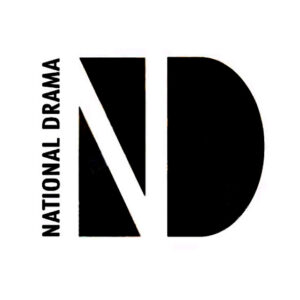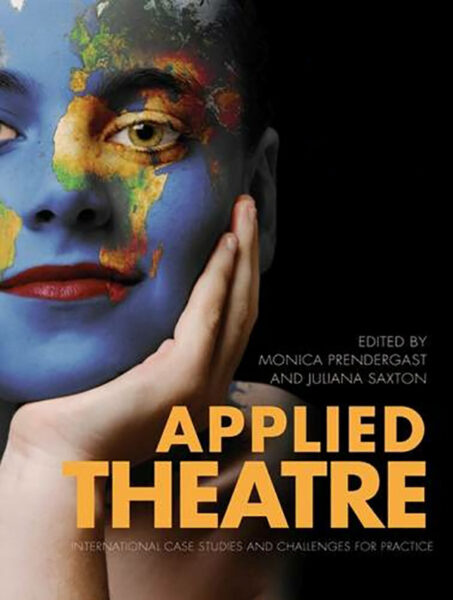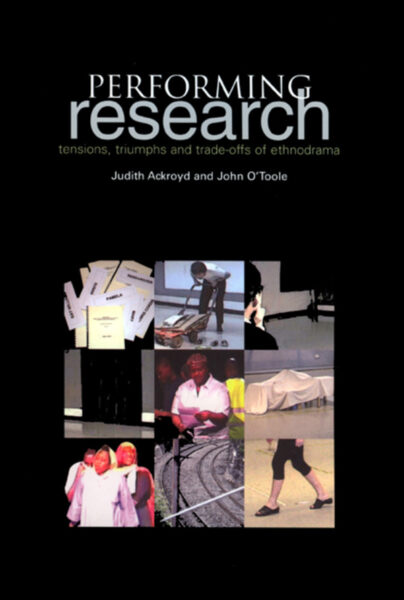
Editorial

Volume 2 Editorial
This issue is dedicated to Dorothy Heathcote who has been honoured by the Queen with an MBE (Member of the British Empire) in recognition of her services to Drama as Education. Those of us who practise in the field of drama education stand on the shoulders of giants. She is one of them.

Volume 2 Editorial
This issue is dedicated to Dorothy Heathcote who has been honoured by the Queen with an MBE (Member of the British Empire) in recognition of her services to Drama as Education. Those of us who practise in the field of drama education stand on the shoulders of giants. She is one of them.
Articles

A Drama About Drama: the transformation of ethnographic data into dramatic form
This paper reports on the development of an ethnographic performance (a play based on research data), which was written and performed as part of an educational ethnography.

Drama Movement Techniques and Formation of Self- Creative Competences of a Child at the Early School Age – Initial Approach
The paper describes the results of a pilot study conducted in Poland which was aimed at finding out the answer to the following research question: Does the kinaesthetic interpretation of the text influence the level of self-creative potential and the process of self-reflection? If so, how does it happen?

How to make them fly? – Development frameworks for drama
This article will describe the role that human development plays in drama activities. It is based on studies that were carried out in several Polish cities as part of a PhD thesis held at Warsaw University (Witerska 2010).

Daisy’s diary: issues surrounding teaching history through drama
This article discusses the relationship between drama as a means of both exploring and conveying history.

Transforming passive Indian classrooms to creative spaces through creative drama
The process of schooling plays a significant role in shaping the lives of children in the contemporary society.

Bringing Shakespeare to life in the Primary School: A Play in a Day
For the last four years Hilary Lee-Corbin has initiated and conducted a research project aimed at introducing Shakespeare to primary children in an accessible and active manner. The initial idea was that by doing this children would be able to approach Shakespeare more easily when they come to study his works in the secondary school. Children’s attitudes towards Shakespeare have been explored in this study using Personal Construct Psychology and Repertory Grids, Stimulated Recall and Semi-structured Interviews.

A Drama About Drama: the transformation of ethnographic data into dramatic form
This paper reports on the development of an ethnographic performance (a play based on research data), which was written and performed as part of an educational ethnography.

Drama Movement Techniques and Formation of Self- Creative Competences of a Child at the Early School Age – Initial Approach
The paper describes the results of a pilot study conducted in Poland which was aimed at finding out the answer to the following research question: Does the kinaesthetic interpretation of the text influence the level of self-creative potential and the process of self-reflection? If so, how does it happen?

How to make them fly? – Development frameworks for drama
This article will describe the role that human development plays in drama activities. It is based on studies that were carried out in several Polish cities as part of a PhD thesis held at Warsaw University (Witerska 2010).

Daisy’s diary: issues surrounding teaching history through drama
This article discusses the relationship between drama as a means of both exploring and conveying history.

Transforming passive Indian classrooms to creative spaces through creative drama
The process of schooling plays a significant role in shaping the lives of children in the contemporary society.

Bringing Shakespeare to life in the Primary School: A Play in a Day
For the last four years Hilary Lee-Corbin has initiated and conducted a research project aimed at introducing Shakespeare to primary children in an accessible and active manner. The initial idea was that by doing this children would be able to approach Shakespeare more easily when they come to study his works in the secondary school. Children’s attitudes towards Shakespeare have been explored in this study using Personal Construct Psychology and Repertory Grids, Stimulated Recall and Semi-structured Interviews.
MA Emergent Researcher

Does an active approach to the teaching of Hamlet in urbans schools facilitate literacy learning and social learning?
I researched whether a ‘thick’ curriculum (Geertz 1993) could make Shakespeare accessible and relevant to all pupils, improve literacy and foster social learning.

Does an active approach to the teaching of Hamlet in urbans schools facilitate literacy learning and social learning?
I researched whether a ‘thick’ curriculum (Geertz 1993) could make Shakespeare accessible and relevant to all pupils, improve literacy and foster social learning.
Book Reviews

Applied Theatre: International Case Studies and Challenges for Practice
This book advances the current debate between Applied Drama and Applied Theatre and is likely to become an important contribution. As reviewer Brian Heap observes:’One great advantage to a book like this, of course, is that it provides ready access to a range of key articles from what might otherwise be, for the individual student or researcher at least, prohibitively expensive journals. In addition, the fact that they are thematically arranged helps the reader to focus on his/her immediate interest.
By Monica Prendergast and Juliana Saxton (editors)

Performing Research: Tensions, triumphs and trade-offs of ethnodrama
This thoughtful and intelligent volume is a timely analysis of the burgeoning field of ethnodrama, anchored in six case studies. The co-authors guide the reader through the dominant questions and paradoxes of the sub-discipline while wisely dwelling little on the relative merits of any particular label. The title for the book is well chosen since the performance of research is the concept that forms the common denominator for all the myriad off-shoots to which academics and practitioners swear allegiance.
By Judith Ackroyd and John O’Toole

Applied Theatre: International Case Studies and Challenges for Practice
This book advances the current debate between Applied Drama and Applied Theatre and is likely to become an important contribution. As reviewer Brian Heap observes:’One great advantage to a book like this, of course, is that it provides ready access to a range of key articles from what might otherwise be, for the individual student or researcher at least, prohibitively expensive journals. In addition, the fact that they are thematically arranged helps the reader to focus on his/her immediate interest.
By Monica Prendergast and Juliana Saxton (editors)

Performing Research: Tensions, triumphs and trade-offs of ethnodrama
This thoughtful and intelligent volume is a timely analysis of the burgeoning field of ethnodrama, anchored in six case studies. The co-authors guide the reader through the dominant questions and paradoxes of the sub-discipline while wisely dwelling little on the relative merits of any particular label. The title for the book is well chosen since the performance of research is the concept that forms the common denominator for all the myriad off-shoots to which academics and practitioners swear allegiance.
By Judith Ackroyd and John O’Toole
Editorial Board

Volume 2 Editorial Board
Pamela Bowell
Amanda Kipling
Chris Lawrence
Marie-Jeanne McNaughton
Ruth Sayers

Volume 2 Editorial Board
Pamela Bowell
Amanda Kipling
Chris Lawrence
Marie-Jeanne McNaughton
Ruth Sayers
Notes on Authors

Volume 2 Notes on Authors
Alicja Galaska works in the Faculty of Education and Psychology at the University of Silesia in Katowice and is also a director of Educational Center “Future” .

Volume 2 Notes on Authors
Alicja Galaska works in the Faculty of Education and Psychology at the University of Silesia in Katowice and is also a director of Educational Center “Future” .
Table of Contents

